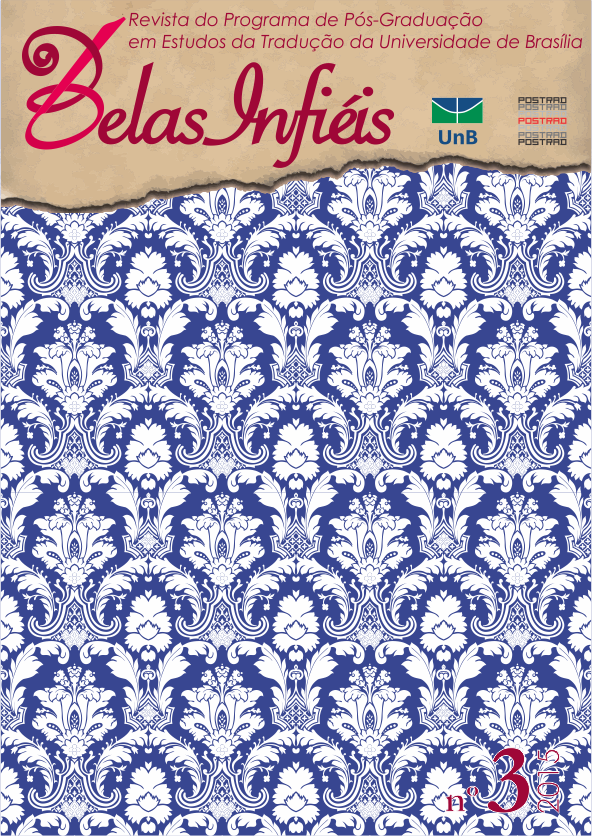TRADUÇÃO COMENTADA DE MEMOIRES DE PORC-EPIC, DE ALAIN MABANCKOU (2006)
DOI:
https://doi.org/10.26512/belasinfieis.v4.n3.2015.11361Palabras clave:
tradução de prosa, Alain Mabanckou, literatura de expressão francesaResumen
Neste artigo iremos propor a tradução dos parágrafos finais de cada um dos seis capítulos do romance Mémoires de porc-épic, do escritor congolês Alain Mabanckou, a fim de analisar e comentar algumas escolhas tradutológicas concernentes a elementos formais e culturais propostos no texto original. Para nós, seguindo a abordagem sugerida por Berman (2007), tais elementos fazem parte do modo de significar do texto de partida e devem ser passados ao leitor estrangeiro tanto quanto possível, de modo que ele possa, assim como o leitor francês, experienciar o universo africano recriado pelo autor. Dessa forma, acreditamos que um enfoque tradutório com teor estrangeirizante, que considere a cultura do Outro, e a faça emergir no texto traduzido, se faz necessário.
Descargas
Citas
BERMAN, A. A tradução e a letra ou o albergue do longínquo. Rio de Janeiro: 7Letras, 2007.
GALEMBECK, Paulo de T. “O turno conversacional”. In: PRETI, D.(org.). Análise de textos orais. São Paulo: Humanitas, 2003,p.65-92.
MABANCKOU, A. Mémoires de porc-épic. Paris: Seuil, 2006.
_______________.Écrivain et oiseau migrateur. Waterloo: André Versaille, 2011.
Descargas
Publicado
Cómo citar
Número
Sección
Licencia
Copyright Statement
Given the public access to this journal, the texts are free to use but requires the recognition of the original authorship and initial publication in this journal to be properly stated.
The journal allows the use of works published for non-commercial purposes, including the right to submit the work to publicly accessible databases. Published contributions are the sole and exclusive responsibility of the author(s).
- When submitting papers to be evaluated by the Belas Infiéis journal, the author(s):
- Declare that the contents of the contributions are original and of their original creation, being entirely responsible for their content if there is an objection by third parties.
- Claim to be aware that they should not commit academic plagiarism.
- Declare that the manuscript has not been published, completely or partially, in Portuguese or another language. If it is a translation it should be submitted to the Translated Articles section.
- Declare that the manuscript is not being evaluated by other journals.
- Declare that the manuscript was not submitted to another journal simultaneously.
- Commit(s) to inform the journal of any kind of error or inaccuracy in their contribution (published, in evaluation or in editing) and to collaborate with the editors to make due corrections of the article (when in evaluation or editing) or erratum/retraction (after publication).
- Declare that there is no conflict of interest regarding the published work.
- Authorize its release if it is accepted for publication without any kind of monetary compensation.
- Agree to assign non-exclusive rights to publication to the magazine, remaining free to make their contribution available in other media as long as the publication of the first version in Belas Infiéis magazine is mentioned. They also authorize Belas Infiéis to assign their texts for reproduction in content indexers, virtual libraries and similar platforms.
- Maintain copyright and grant the journal the right of first publication, the work being licensed under theCreative Commons Attribution License.
- Is/Are allowed and encouraged to publish and distribute their work online after the editorial process, which may increase the impact and citation of the published work.
- Authorize the editorial team to make textual adjustments and to adapt the article to the publication rules, when necessary.



















